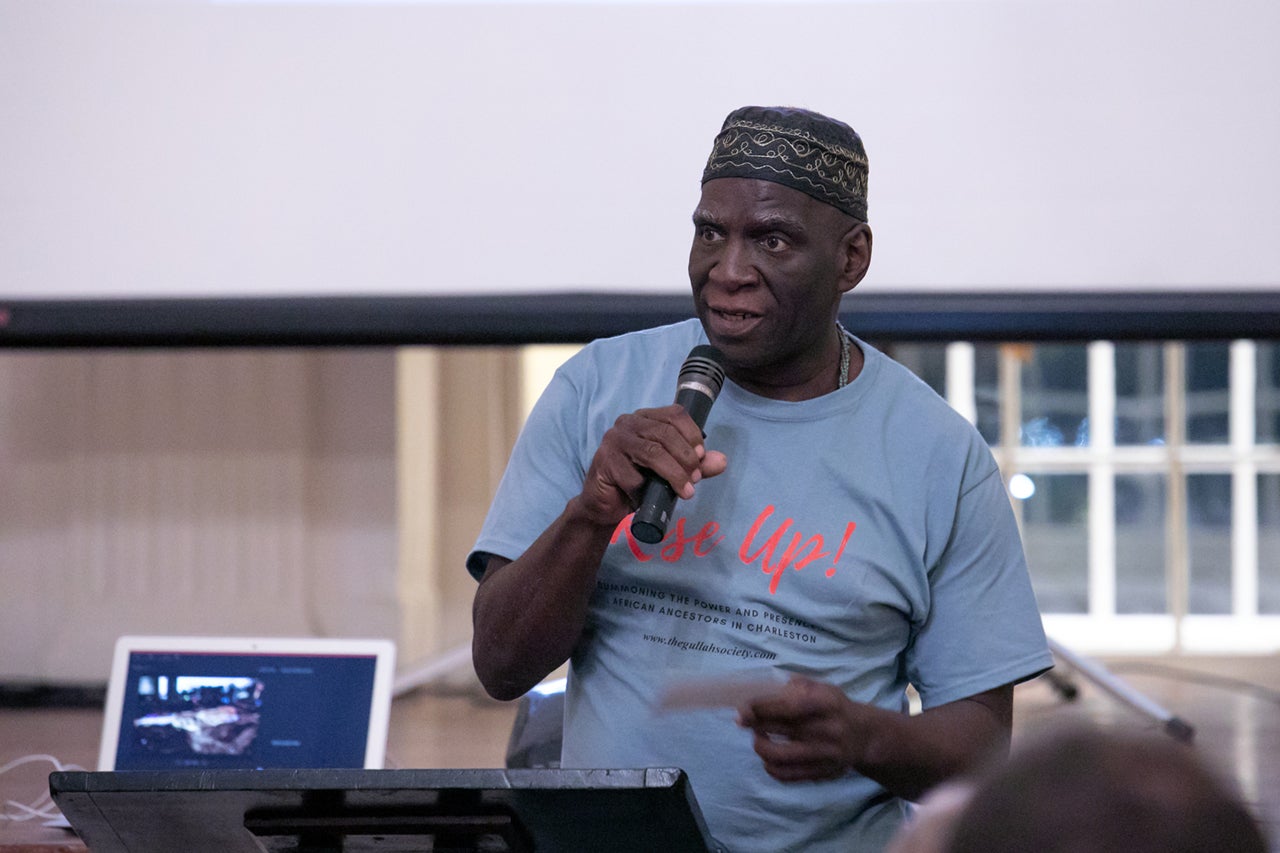The 2013 renovation of the Gaillard Performing Arts Center yielded far more than a sleek, state-of-the-art concert hall. During construction, the project also unearthed grave sites of 36 enslaved Africans and people of African descent from the 1700s. Now, that discovery will reveal more still.
That’s because of a research grant from the National Geographic Society given to the Gullah Society, which has allowed for DNA analysis to be conducted on the remains. The findings will shed light on the genetic ancestry of the 36 individuals and identify whether they were related to each other – and may even provide a link to living descendants in the Charleston area. The DNA analysis was conducted in partnership with Theodore Schurr and Raquel Fleskes, genetic anthropologists at the University of Pennsylvania.
All this links to the College of Charleston by way of the research grant recipients, adjunct anthropology professors Ade Ofunniyin and Joanna Gilmore. “Dr. O,” as Ofunniyin is called at the College, founded the Gullah Society in Charleston to preserve and celebrate Gullah-Geechee culture in the Lowcountry, including ancestral burial grounds like those at the Gaillard. The grants enable the community to gain greater insight into their connections with ancestors by way of modern science.
“We have to use this science to allow these kinds of connections to be made,” says Ofunniyin. “At the same time we have to police it so that it can’t be misused or abused.”
An update on that research will be shared at two events on Wednesday, Feb. 27, 2019, including a brown bag lunch lecture on campus and an evening event called “Egungun Tunji: Ancestors Rise Again!” These events mark the continuation of a conversation about the burials that has played out for the past five years. In the fall of 2018, the College hosted “Rise Up: Summoning the Power and Presence of African Ancestors in Charleston,” where architectural history students presented proposed designs for a memorial at the Anson Street reinterment site. Their designs have been exhibited at the College’s Addlestone Library and will be on display at the “Egungun Tunji” event this week.
The latest events will include a brown bag lunch on campus featuring a short talk with architect Rodney Leon, founder and principal of Rodney Leon Architects and the designer of the African Burial Ground National Monument in New York City and a memorial at the United Nations in honor of the victims of slavery and the Transatlantic Slave Trade, followed by an update about the DNA research by Theodore Schurr and Raquel Fleskes. The talk will take place from 12 p.m. to 1 p.m. in the College’s Robert Scott Small Building (175 Calhoun St.), room 235.
Later that day, the Gullah Society will present “Egungun Tunji: Ancestors Rise Again,” which will take place from 6:30 p.m. to 8:30 p.m., and will be hosted by the City of Charleston at the Cannon Street Arts Center at 134 Cannon St.
Welcome remarks will be given by Ofunniyin and Bernard Powers, professor emeritus of history at the College of Charleston and director of the College’s new Center for the Study of Slavery in Charleston. Schurr and Fleskes will provide a detailed update on the DNA research being conducted on the remains of the Anson Street Burials as well as an overview of the results of research into the ancestry of the 78 people of African descent living in Charleston today. The keynote talk will be provided by cultural architect Rodney Leon.
At a pre-event reception some of the 78 living DNA research participants will be handed an envelope with his or her individual results. Those results may very well contain long lost parts of their own history in Charleston and beyond.
“This is an opportunity for them to answer questions about their heritage they’ve been wondering about for a long time,” say Ofunniyin.
The anthropologist knows firsthand how meaningful that knowledge can be. In his early twenties while living in New York City, the Charleston native discovered the traditions of the Yoruba people of Southwestern Nigeria, and he has been practicing those traditions ever since.
Two weeks ago, Ofunniyin found out his own DNA results: “I’m 84 percent Yoruba.”
He also found out that he was closely connected with another participant. Their great-great-great-great grandparents were sister and brother.
“That places them in slavery,” he says.
This Wednesday, dozens of others may discover such deeply meaningful connections to our city, to faraway places and to one another.
Featured image: Adjunct anthropology professor Ade Ofunniyin speaks at an event last fall regarding the DNA research of the African remains found at the Gaillard Center.




